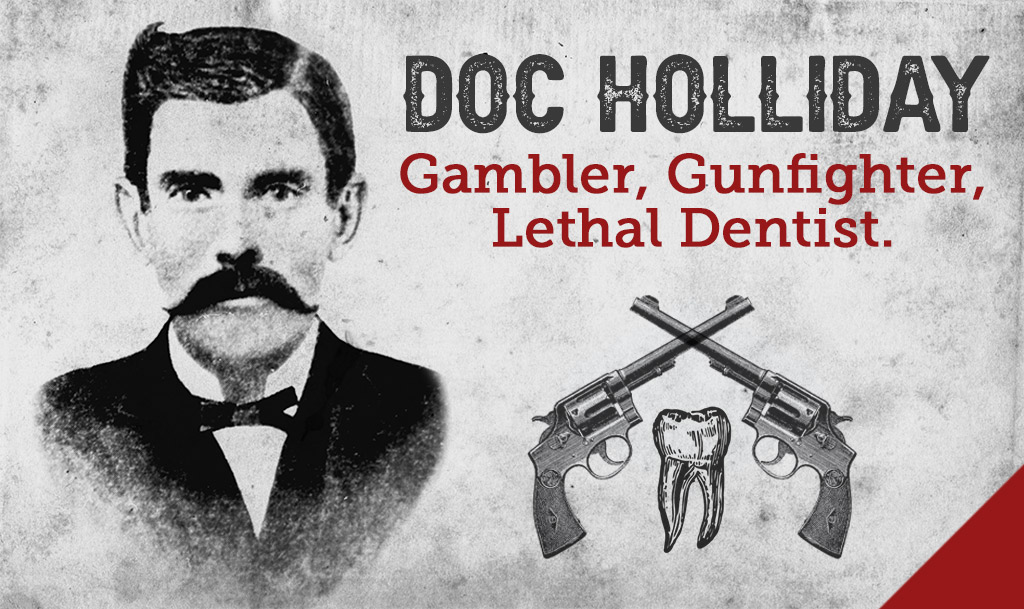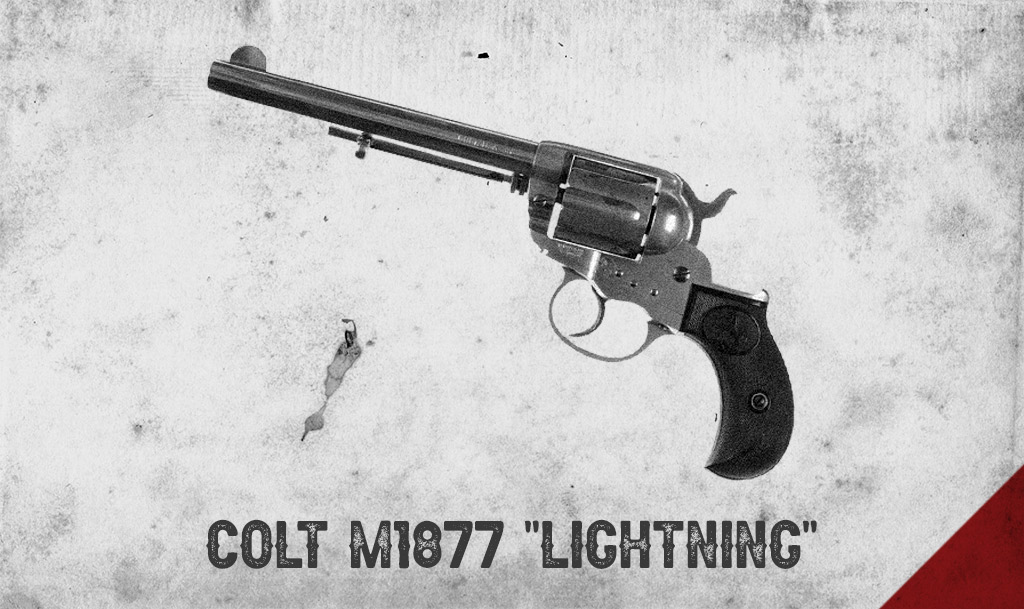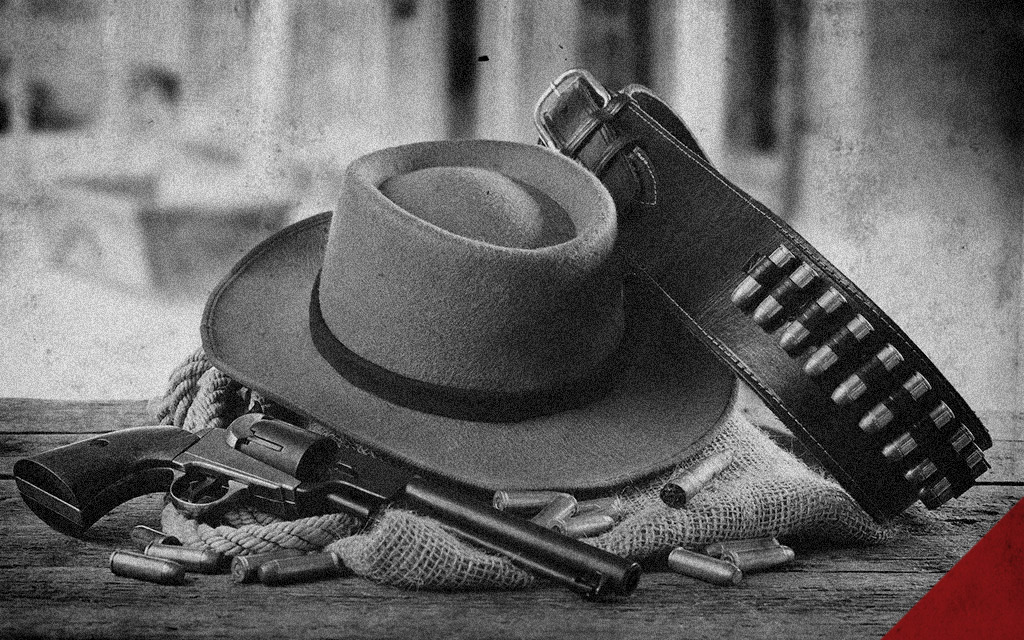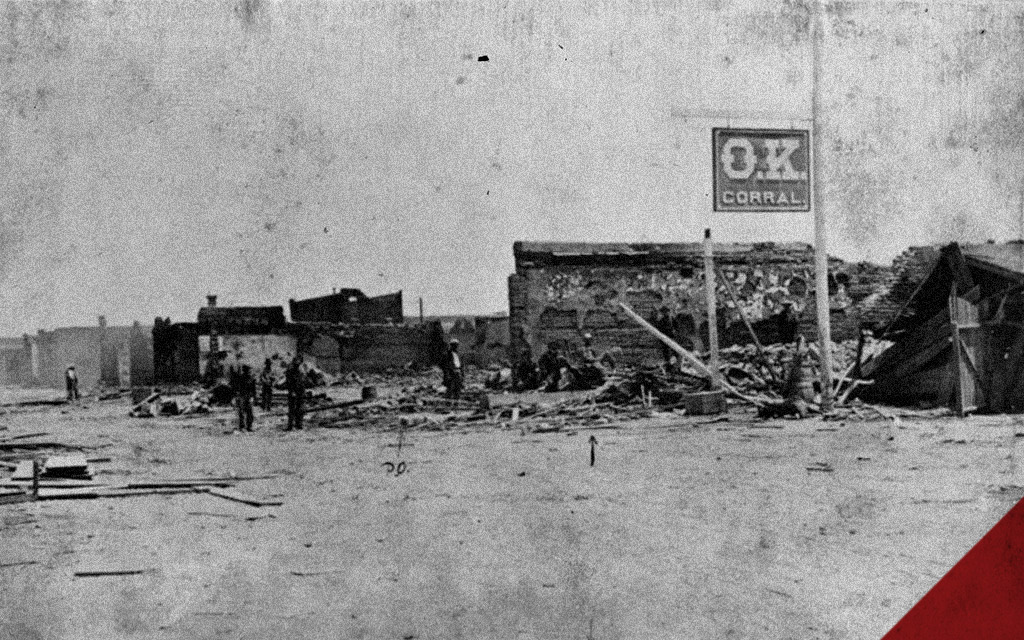https://www.wideners.com/blog/doc-holliday-lethal-dentist-of-the-ok-corral/APRIL 1, 2021 HISTORY

Despite an unending supply of myths connected with characters from the Old West, Wyatt Earp’s description of Doc Holliday is right on target. Doc was a gambler, vagabond, philosopher, and gunfighter. An educated man from a respected family, John Henry (Doc) Holliday graduated from the Pennsylvania College of Dental Surgery in 1872.
“
I found him a loyal friend and good company. He was a dentist whom necessity had made a gambler; a gentleman whom disease had made a vagabond; a philosopher whom life had made a caustic wit; a long, lean blonde fellow nearly dead with consumption and at the same time the most skillful gambler and nerviest, speediest, deadliest man with a six-gun I ever knew.”
– Wyatt Earp describing his friend, Doc Holliday
Not long after starting his own dental practice, Holliday was diagnosed with tuberculosis. Known as consumption back then, the disease had already taken Doc’s mother. It’s likely he contracted it from her before she died.
A Career ChangeThe physicians that Doc consulted told him he probably had only a short time remaining. They wisely advised him to move to a dryer climate. So, in the fall of 1873, Doc Holliday packed up and moved to Dallas, Texas. At first, he found work with another dentist, but his constant coughing spells were bad for business, and he was forced from the practice.
Doc was a “fish out of water” in his new surroundings. As an educated and refined man with an illness that had left him considerably weakened, his prospects for employment in the rough and tumble western environment were limited at best. Here was a man who dressed stylishly, played the piano very well, and displayed the manners of a Southern gentleman.
Unsurprisingly, he was drawn to gambling. A skill at which he could use his intelligence to earn a living. He was soon supporting himself both as a gambler and a dealer. Knowing that he would not live long made him wretched and moody, leading him to heavy drinking and a short temper.
Realizing that his career as a gambler could be dangerous, he decided to protect himself with some advanced training on a pistol and by carrying a long knife. These proactive decisions saved his life on several occasions.
Doc Holliday’s Guns
Many famous outlaws and lawmen carried the Colt M1877 Lightning in the old west.
In 1881, Doc Holliday would be a participant in one of the Old West’s most glorified shootouts: The Gunfight at the OK Corral in Tombstone, Arizona. Side-by-side with the Earp brothers, Holliday faced off against five outlaws in a firefight that would last all of 30 seconds.
Doc carried and used a 10-gauge sawed-off double-barreled shotgun during the encounter and has forever been associated with it. If you’ve ever shot a 10-gauge of standard barrel length, you’ll understand why that’s impressive. The 10-gauge kicks like a mule, it’s twice as mean as shooting standard length 12-gauge shells. But the truth is that the only reason he had the shotgun was that Virgil Earp, the Tombstone sheriff, had handed it to him minutes before the fight began.
In the book Wyatt Earp, Frontier Marshal, Wyatt himself talks about Doc’s role in the gunfight and the shotgun he carried: “Doc Holliday never carried a sawed-off shotgun into a fight but once in his life, and upon this one occasion (the Tombstone gunfight) he threw the gun down in disgust after firing one shot and jerked the nickel-plated Colt which was for years his favorite weapon.”
The “nickel-plated Colt” that Earp mentions is the .41 caliber Colt M1877, a double-action revolver that bore the nickname “Thunderer.” He would later add a .38 caliber Colt “Lightning” (also nickel-plated) that was chambered in the .38 Long Colt. These cowboy cartridges later evolved into the .38 S&W and the modern .38 Special.
While the OK Corral incident made Doc famous, it was not his first experience with violence—nor would it be his last.
The First Gunfight
Gunfights were a common occurrence in the wild west, many disagreements were settled in the streets.
Early in 1875, Doc and a Dallas saloonkeeper had a disagreement that turned violent. While several shots were fired, all missed their mark, and both men were arrested without injuries. The locals joked about the incident until Doc got into another dispute a few days later—this one ending in the death of a well-known citizen.
Holliday was forced to flee Dallas with a posse on his tail and ended up in Jacksboro, Texas. There he found work in saloons as a card dealer. Doc carried one six-shooter in a shoulder holster and another on his hip. His long knife was also at the ready.
By now an expert shot, Doc was embroiled in three gunfights in a short time. Although he killed one man, no one took action against him. No specific law for dueling or self-defense existed in the small cow town at the time.
Doc Holliday On The RunIn the summer of 1876, another disagreement ended with Doc killing a soldier from nearby Fort Richardson. Holliday was on the run once more with a bounty on his head and the Texas Rangers in hot pursuit. His escape took him into Apache country and several stops throughout Colorado, leaving at least three more dead bodies behind him.
He eventually settled down in Denver under an assumed name and took on work as a dealer. His anonymity lasted until he got into an argument with a gambler, during which he used his knife to mutilate his opponent. Things in the wild west could become grisly quickly. It was better to be armed to the teeth, than dead in the streets.
Doc was once again running for his life, weaving his way through Wyoming, New Mexico, and finally, back to Texas. At Fort Griffin, he would meet two people who would influence the next years of his life.
“Big Nose” Kate & Wyatt EarpWhile dealing cards at a local saloon in Fort Griffin, Doc met an attractive dance hall girl named Mary Catherine Elder Haroney. Because of her rather prominent nose, she was mostly known as “Big Nose” Kate. The tough, hot-tempered prostitute would become Doc Holliday’s common-law wife. The couple would endure a stormy relationship until his death.
Wyatt Earp was on the trail of train robber Dave Rudabaugh when he stopped into the saloon for information on the fugitive. The saloon’s owner directed Earp to Doc’s table because Holliday had played cards with Rudabaugh. Doc gave Earp some helpful information that resulted in Rudabaugh’s apprehension, and the two would form a lifelong friendship.
Aftermath Of The OK Corral
The legendary OK Corral is located in Tombstone, AZ.
Doc Holliday and the Earps had killed three of the outlaws in the shootout, and the surviving gang members were out for revenge. Two months after the gunfight, they ambushed Virgil Earp, leaving him maimed for life. Two months later, they assassinated Morgan Earp as he played a game of pool. Now it was Wyatt Earp’s turn to seek revenge. Doc Holliday would be by his side for much of it.
After the smoke cleared about a year later, Holiday, Earp, and the rest of their so-called posse eliminated Billy Clanton, Frank and Tom McLaury, Frank Stillwell, and fourteen other outlaws associated some way with the killing of Morgan Earp and the shooting of Virgil.
Doc Holliday: A Peaceful Ending To A Violent LifeDoc Holliday spent the last two months of his life lying in a hotel bed. His health had greatly deteriorated and he was delirious much of the time. On November 8, 1887, he awoke and asked for a glass of whiskey. As he was enjoying his final drink, he looked at his bare feet. He remarked to those around him, “This is funny.” Those were his last words. Some believe these were words of surprise since he always thought he would be killed with his boots on.
Nobody knows how many lives Doc Holliday took. He almost lost his own life nine times: four attempted hangings and the five times he was shot. He likely would have never predicted he would die in bed. The deadliest man with a six-gun in the West was gone, but his legend lives on.
“
There is scarcely one in the country who had acquired a greater notoriety than Doc Holliday, who enjoyed the reputation of being one of the most fearless men on the frontier, and whose devotion to his friends in the climax of the fiercest ordeal was inextinguishable. It was this, more than any other faculty, that secured for him the reverence of a large circle who were prepared on the shortest notice to rally to his relief.”
–Obituary of John Henry (Doc) Holliday